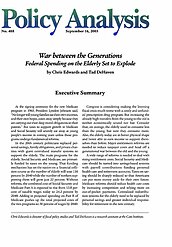In the 20th century politicians replaced personal savings, family obligations, and private charities with giant centralized transfer systems to support the elderly. The main programs for the elderly, Social Security and Medicare, are primarily funded by taxes on the young. That funding mechanism has set the nation on a financial collision course as the number of elderly will soar 116 percent by 2040 while the number of workers supporting them will grow just 22 percent. Without reforms, the combined cost of Social Security and Medicare Part A is expected to rise from 13.8 percent of taxable wages today to 24.2 percent by 2040. Adding in projected spending on Part B of Medicare pushes up the total projected costs of the two programs to 30 percent of wages by 2040.
Congress is considering making the looming fiscal crisis much worse with a costly and unfunded prescription drug program. But increasing the already high transfers from the young to the old is neither economically sound nor fair. Consider that, on average, the elderly used to consume less than the young, but now they consume more. Also, the elderly today are in better physical shape and better able to earn income to support themselves than before. Major entitlement reforms are needed to reduce taxpayer costs and head off a generational war between the old and the young.
A wide range of reforms is needed to deal with rising entitlement costs. Social Security and Medicare should be turned into savings-based systems with payroll contributions funding personal health care and retirement accounts. Taxes on saving should be sharply reduced so that Americans can put more money aside for their own future. Medicare reforms should reduce health care costs by increasing competition and relying more on out-of-pocket payments. Centralized redistribution systems for the elderly need to be replaced by personal savings and greater individual responsibility for retirement in the new century.



